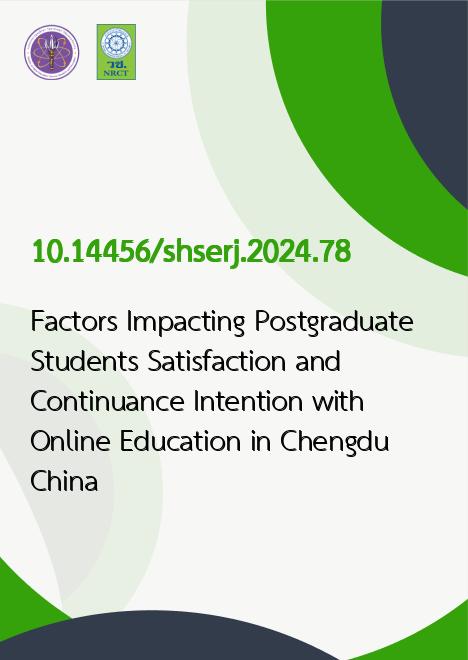
|
Factors Impacting Postgraduate Students Satisfaction and Continuance Intention with Online Education in Chengdu China |
|---|---|
| รหัสดีโอไอ | |
| Creator | Yuli Zeng |
| Title | Factors Impacting Postgraduate Students Satisfaction and Continuance Intention with Online Education in Chengdu China |
| Publisher | Assumption University Press |
| Publication Year | 2567 |
| Journal Title | The Scholar: Human Sciences |
| Journal Vol. | 16 |
| Journal No. | 3 |
| Page no. | 257-267 |
| Keyword | Online Education, Perceived Ease of Use, Perceived Usefulness, Satisfaction, Continuance Intention |
| URL Website | http://www.assumptionjournal.au.edu/index.php/Scholar/article/view/7690 |
| Website title | The Scholar: Human Sciences |
| ISSN | 2586 - 9388 |
| Abstract | Purpose: This study examined the satisfaction and continuance intention of post-graduates pursuing a degree in accounting, translation, Chinese language and literature, and ideological and political education in Chengdu, China, for online learning. The conceptual framework includes perceived ease of use, perceived usefulness, system quality, service quality, information quality, satisfaction, and continuance intention. Research design, data, and methodology: This study employed a quantitative survey approach to gather data from a sample of 500 postgraduate participants. To gauge the research instrument's validity, Item-Objective Congruence (IOC) was employed, and the internal consistency reliability was assessed through a pilot study using the Cronbach alpha coefficient. The sampling methodology encompassed a combination of judgmental, quota, and convenience sampling techniques. Data analysis involved evaluating model fit, reliability, and validity through Confirmatory Factor Analysis (CFA) and Structural Equation Models (SEM). Results: In this study, all hypotheses find support. Perceived ease of use, perceived usefulness, system quality, service quality, and information quality exert significant influences on satisfaction. Notably, perceived ease of use significantly affects perceived usefulness, while satisfaction notably influences continuance intention. Conclusions: The findings help gain a greater awareness of the main variables that impact the acceptance and application of internet-based instruction in higher education institutions. |
